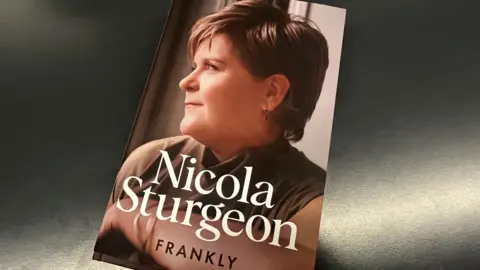Nicola Sturgeon’s memoir, titled “Frankly,” has recently hit the shelves, earlier than many anticipated, after an array of newspaper serializations and interviews that unveiled some intriguing excerpts. The former First Minister of Scotland is known for her remarkable tenure, which included an impressive record of eight consecutive election victories. The memoir offers candid insights into the highs and lows that characterized her time in office, particularly the profound impact political challenges had on her mental well-being.
One of the most noteworthy themes of Sturgeon’s memoir is the controversy surrounding transgender rights, which emerged during the final months of her administration. Sturgeon reflects on a period fraught with turmoil and division, admitting her regrets over the legislative process aimed at facilitating easier legal gender changes. She mulls over whether she should have taken a step back—a pause for consensus would have perhaps tempered the rancorous atmosphere surrounding the debates on this contentious issue. Despite the regrets, she remains a strong advocate for the principles of gender self-identification.
Sturgeon does not shy away from recounting her struggles regarding high-profile transgender cases, notably the situation involving Isla Bryson, a double rapist who was initially held in a women’s prison after identifying as female. This case, according to Sturgeon, humanized fears that many had only previously viewed in abstract terms. She candidly addresses her struggles articulating a position during the uproar and admits to moments of internal conflict, where she felt her hesitation made her appear evasive and lacking conviction. The complexity of her situation echoes much of the broader societal debates concerning gender and identity.
A significant chapter of her life involves her relationship with Alex Salmond, a central figure in her career who has since become estranged due to sexual misconduct allegations against him. Sturgeon’s memoir discusses their complicated history and underscores the political ramifications of the allegations, which have cast a shadow over Scottish politics. Despite Salmond’s judicial victories, Sturgeon is critical of his claims regarding conspiracy, emphasizing that these assertions undermine the credibility of the institutions at the heart of Scottish democracy.
The independence referendum of 2014 stands out as a defining moment in Sturgeon’s political career. She recalls the sense of optimism she felt as Scotland prepared to vote on its future. Still, she reveals the immense pressure she experienced while managing the campaign, particularly her feelings of being left to carry the burden—highlighted when she criticizes the media’s handling of their narrative. This experience proved pivotal, shaping her understanding of the political landscape and her role within it.
Sturgeon provides a stark account of her experience during the COVID-19 pandemic. Leading Scotland through the crisis weighed heavily on her physically and mentally. She reveals her deep-seated fears about the impact of delayed lockdown measures and candidly shares her emotional turmoil during a UK inquiry regarding her government’s response to the virus. This intensely personal chapter reveals a vulnerable side to the public persona that Sturgeon has cultivated over the years.
Moreover, Sturgeon’s memoir touches on themes of misogyny and sexism, depicting experiences of bullying and inappropriate comments she faced as a female politician. She reflects on an instance from her early parliamentary career, revealing the deeply embedded cultural issues women face in political spaces. Sturgeon also delves into her personal challenges, reiterating her struggles with self-esteem despite her public image of confidence, addressing her struggles with fertility and age, and emphasizing the societal pressures placed upon women.
As she draws her narrative to a close, Sturgeon reflects on her future, hinting at changes she hopes to embrace in her post-political life, admitting her potential plans to live outside of Scotland for a while. Additionally, she expresses a desire to explore creative pursuits, like writing a novel. Ultimately, she reaffirms her unwavering commitment to Scotland’s independence, maintaining that her life’s work has been and will continue to be dedicated to this cause, believing that Scotland will achieve independence within the next two decades. The memoir serves not just as a reflection of her experiences but as a testament to her enduring complexities, challenges, and aspirations on both personal and political fronts.











